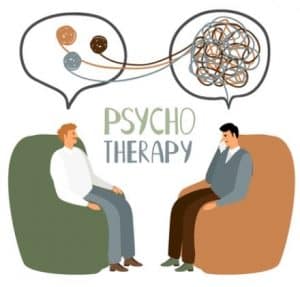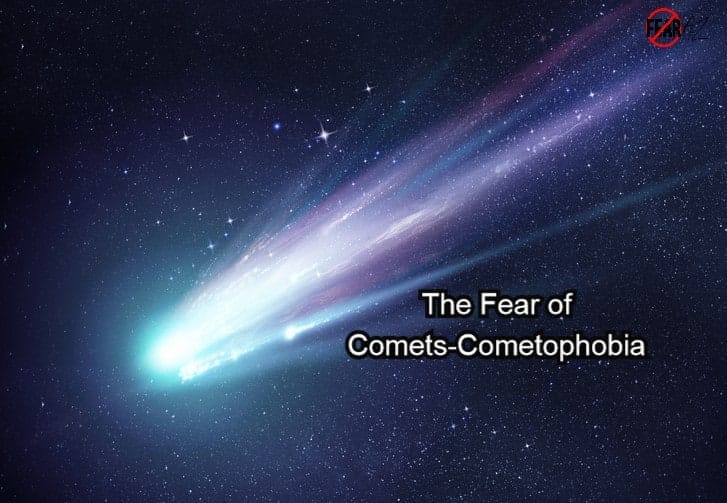Share This Article
Decoding Cometophobia: The Fear of Comets
Do you get anxious just thinking about comets, let alone seeing one? Is your anxiety so severe it causes you to have a full-fledged panic attack?
For some, comets are an alluring sight indicative of prophecy or good news. Others see them as a sign of death or disaster and are terrified of them. If that’s the case with you, you probably suffer from a phobia of comets.
If you’re looking for the fear of comets phobia name, it’s called cometophobia. Let’s have a look at this unusual but intriguing phobia and learn ways to cope with it.

All about Cometophobia
Comets have aroused anxiety and terror in many different cultures and communities throughout history. They have been labeled as “The Harbinger of Doom” and “The Menace of the Universe.” They are considered as both catastrophic omens and heavenly messengers.
Cometophobia Meaning
Cometophobia is a morbid fear of comets. It’s a type of phobia that is associated with the phenomena itself or even celestial bodies. Those who suffer from this phobia of comets are terrified of them or events associated with them. Such a natural occurrence is usually linked to bad omens or false perceptions about outer space.
Cometophobia Causes
This fear can develop as a result of reading or watching science fiction novels or movies. Comets are frequently depicted as the precursor of death and devastation in these stories, and advancements in special effects can cause major anxiety in individuals suffering from cometophobia.
Cometophobia, or fear of comets, can also develop in someone who is highly spiritual and believes in a variety of prophecies relating to the end of the world. In certain religions, apocalypse is anticipated by comets falling, destroying the planet and its civilization.
Although comets are scientifically just a combination of rocks, ice, and stardust, some people think they are messages from the dead or indications that the world is about to end. Some believe these are intergalactic ships sent by aliens to attack Earth.
Symptoms of Cometophobia
Cometophobia causes a great deal of fear and anxiety in people who suffer from it. Symptoms can differ based on the severity of anxiety associated with the comets. Symptoms can show when the person looks at photos of comets. The sheer act of talking or even thinking about comets can trigger a panic attack.
Cometophobia does not need a sufferer to be in a scenario where they are exposed to comets. Our brain is capable of inducing symptoms of panic and fear even when we are not encountering our phobia trigger.
Anxiety, like with almost every other phobia, will be the most noticeable symptom for one suffering with cometophobia. This can get to the point where the person experiences an actual panic attack. They may have to be treated depending on the intensity of their panic attack. However, this differs from person to person and is determined by a variety of factors.
Mental/Emotional Symptoms
When exposed to its stimuli, such as comets, the following symptoms can be observed in those suffering from cometophobia:
- Suicidal thoughts
- Fear of dying or fainting
- Anger and irritation
- Anxiety
- Depression
- Guilt and shame
- Mood swings
- Extreme fear
Physical Symptoms
Panic attacks are one of the most common symptoms of cometophobia. Most of the time, these symptoms occur unexpectedly and without any preceding indications or warnings. A panic attack can result in severe physical symptoms, including but not limited to those listed below:
- Excessive sweating
- Tremors
- Shivering
- Stomach cramps
- Headaches
- Dry mouth
- Rapid heart rate
- Difficulty in breathing
- Choking sensation
- Chest pain
- Nausea & dizziness
- Numbness
- Hypertension
- Hyperventilation
- Confusion and disorientation
- Insomnia
- Restlessness
There may be individuals who have several phobias that are interlinked. These are the more complex phobias. These symptoms can impact a person’s daily life and mental health. They can severely restrict someone’s life to the point they are unable to have a normal personal and professional life. Consequently, these can set off a chain reaction and are followed by depression.
How You Can Help Yourself
Phobias must be addressed carefully. If they’re not given adequate attention and care, they may begin to impact the sufferer’s life. In certain situations, severe anxiety can lead to depression.
Taking good care of yourself or being prepared for whatever may happen in the future is one of the easiest ways to conquer any phobia. Knowing how to protect yourself is essential not just for overcoming your fear of comets, but also for controlling other phobias and anxiety before they become more intense.

Professional Help for Cometophobia
Comets are a rare phenomenon. They are magnificent. That’s why when such a natural phenomenon occurs, their viewing is regarded as an outdoor activity and a once-in-a-lifetime event. Someone suffering from cometophobia not only risks missing out on this grand event but also misses out on having fun with their loved ones, who may have chosen to spend the evening observing the comet pass.
Like with most phobias, there is no definitive cometophobia treatment to cure it completely. Nonetheless, there are a variety of treatments available that can help with most of the symptoms of cometophobia. These are:
Exposure Therapy
Exposure therapy is one of the most popular methods of therapy for those who have phobias. It works by progressively exposing the patient to their phobia under the guidance of a therapist. In the case of cometophobia, the therapist may begin by showing them images of comets and then progress to documentaries about comets.
All of this will be done to habituate the patient to their phobia by repeatedly exposing them to it. In theory, the more someone is subjected to something they fear, the less it will affect them in the long run.
Cognitive Behavioral Therapy (CBT)
CBT is another common type of treatment that is frequently used to aid patients suffering from conditions such as generalized anxiety disorder (GAD) and obsessive-compulsive disorder (OCD). CBT therapies are based on the idea that what we believe and perceive frequently influences our behavior.
For instance, when someone is suffering from cometophobia, they could use cognitive behavioral therapy to determine whether the anxiety caused by comets is an accurate representation of reality. And if not, they work on changing that.
CBT involves the patient understanding their perception, emotions, and reactions in response to their fears. Addressing these factors may enable someone suffering from cometophobia to adopt a more realistic approach to their fear of comets.
Medication
Medication should never be taken without first consulting a doctor. In general, medication is not advised for the treatment of phobias. Therapies are an effective means of overcoming phobias. Medications may be taken for anxiety and depression per the doctor’s recommendation.
How to Avoid Cometophobia Altogether
Someone suffering from cometophobia may go to great lengths to avoid encountering their fear in any way possible. This may imply not just avoiding locations where they may see the sight of comets, but also actively attempting to prevent it from occurring by adopting a more practical approach. These may include:
- Avoiding astronomy news
- Avoid looking at photos of comets
- Avoid watching movies with occurrences
- Staying at home when it occurs
- Avoid reading about it
- Seeking help to overcome the phobia
Wrapping It Up
Cometophobia is a rare phobia, and because the trigger is comets, which is rare in itself, individuals who suffer from it seldom experience symptoms.
Cometophobia generally does not need therapy unless the person is working on something associated with comets or in the field of astronomy, because the odds of encountering their phobia are extremely low. Many people believe they can live normally as long as they don’t see a comet. They believe they’re in control of their phobia. That may be the case, but remember to seek help when needed.



